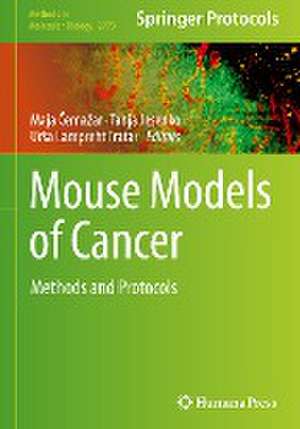Mouse Models of Cancer: Methods and Protocols: Methods in Molecular Biology, cartea 2773
Editat de Maja Čemažar, Tanja Jesenko, Urša Lampreht Trataren Limba Engleză Hardback – 19 ian 2024
Authoritative and practical, Mouse Models of Cancer: Methods and Protocols serves as an ideal guide to these controlled and reproducible model experimental systems to study different aspects of cancer biology, including prevention, development, progression, and treatment.
Din seria Methods in Molecular Biology
- 9%
 Preț: 791.63 lei
Preț: 791.63 lei - 23%
 Preț: 598.58 lei
Preț: 598.58 lei - 20%
 Preț: 882.98 lei
Preț: 882.98 lei -
 Preț: 252.05 lei
Preț: 252.05 lei - 5%
 Preț: 802.70 lei
Preț: 802.70 lei - 5%
 Preț: 729.61 lei
Preț: 729.61 lei - 5%
 Preț: 731.43 lei
Preț: 731.43 lei - 5%
 Preț: 741.30 lei
Preț: 741.30 lei - 5%
 Preț: 747.16 lei
Preț: 747.16 lei - 15%
 Preț: 663.45 lei
Preț: 663.45 lei - 18%
 Preț: 1025.34 lei
Preț: 1025.34 lei - 5%
 Preț: 734.57 lei
Preț: 734.57 lei - 18%
 Preț: 914.20 lei
Preț: 914.20 lei - 15%
 Preț: 664.61 lei
Preț: 664.61 lei - 15%
 Preț: 654.12 lei
Preț: 654.12 lei - 18%
 Preț: 1414.74 lei
Preț: 1414.74 lei - 5%
 Preț: 742.60 lei
Preț: 742.60 lei - 20%
 Preț: 821.65 lei
Preț: 821.65 lei - 18%
 Preț: 972.30 lei
Preț: 972.30 lei - 15%
 Preț: 660.49 lei
Preț: 660.49 lei - 5%
 Preț: 738.41 lei
Preț: 738.41 lei - 18%
 Preț: 984.92 lei
Preț: 984.92 lei - 5%
 Preț: 733.29 lei
Preț: 733.29 lei -
 Preț: 392.60 lei
Preț: 392.60 lei - 5%
 Preț: 746.26 lei
Preț: 746.26 lei - 18%
 Preț: 962.66 lei
Preț: 962.66 lei - 23%
 Preț: 860.22 lei
Preț: 860.22 lei - 15%
 Preț: 652.64 lei
Preț: 652.64 lei - 5%
 Preț: 1055.50 lei
Preț: 1055.50 lei - 23%
 Preț: 883.87 lei
Preț: 883.87 lei - 19%
 Preț: 491.89 lei
Preț: 491.89 lei - 5%
 Preț: 1038.86 lei
Preț: 1038.86 lei - 5%
 Preț: 524.16 lei
Preț: 524.16 lei - 18%
 Preț: 2122.34 lei
Preț: 2122.34 lei - 5%
 Preț: 1299.23 lei
Preț: 1299.23 lei - 5%
 Preț: 1339.12 lei
Preț: 1339.12 lei - 18%
 Preț: 1390.26 lei
Preț: 1390.26 lei - 18%
 Preț: 1395.63 lei
Preț: 1395.63 lei - 18%
 Preț: 1129.65 lei
Preț: 1129.65 lei - 18%
 Preț: 1408.26 lei
Preț: 1408.26 lei - 18%
 Preț: 1124.92 lei
Preț: 1124.92 lei - 18%
 Preț: 966.27 lei
Preț: 966.27 lei - 5%
 Preț: 1299.99 lei
Preț: 1299.99 lei - 5%
 Preț: 1108.51 lei
Preț: 1108.51 lei - 5%
 Preț: 983.76 lei
Preț: 983.76 lei - 5%
 Preț: 728.16 lei
Preț: 728.16 lei - 18%
 Preț: 1118.62 lei
Preț: 1118.62 lei - 18%
 Preț: 955.25 lei
Preț: 955.25 lei - 5%
 Preț: 1035.62 lei
Preț: 1035.62 lei - 18%
 Preț: 1400.35 lei
Preț: 1400.35 lei
Preț: 1164.10 lei
Preț vechi: 1225.37 lei
-5% Nou
Puncte Express: 1746
Preț estimativ în valută:
222.78€ • 231.73$ • 183.92£
222.78€ • 231.73$ • 183.92£
Carte tipărită la comandă
Livrare economică 12-26 aprilie
Preluare comenzi: 021 569.72.76
Specificații
ISBN-13: 9781071637135
ISBN-10: 1071637134
Ilustrații: X, 198 p. 74 illus., 71 illus. in color.
Dimensiuni: 178 x 254 mm
Greutate: 0.59 kg
Ediția:1st ed. 2024
Editura: Springer Us
Colecția Humana
Seria Methods in Molecular Biology
Locul publicării:New York, NY, United States
ISBN-10: 1071637134
Ilustrații: X, 198 p. 74 illus., 71 illus. in color.
Dimensiuni: 178 x 254 mm
Greutate: 0.59 kg
Ediția:1st ed. 2024
Editura: Springer Us
Colecția Humana
Seria Methods in Molecular Biology
Locul publicării:New York, NY, United States
Cuprins
In Vivo Modeling of Leukemia by Murine Stem Cell Transplantation.- NOTCH1-Induced T-Cell Acute Lymphoblastic Leukemia In Vivo Models.- Urinary Bladder Cancer Induced by N-Butyl-N-(4-Hydroxybutyl)-Nitrosamine.- Establishment of Mouse Orthotopic Urinary Bladder Tumor Model and Its Analysis by Light and Electron Microscopy.- Azoxymethane/Dextran Sodium Sulfate (AOM/DSS) Model of Colorectal Cancer.- Isolating Primary Tumor Cells from the MMTV-PyMT Mouse Model and Their Use in Developing an Orthotopic Mouse Model of Breast Cancer.- Transplantable Subcutaneous Tumor Models.- Preclinical Mouse Metastatic Model Established through Induced Lung Metastases.- In Vivo Wound Healing Model for Characterization of Gene Electrotransfer Effects in Mouse Skin.- Partial-Volume Irradiation of Murine Tumors.- In Vivo Bioluminescence and Fluorescence Imaging: Optical Tool for Cancer Research.- Cancer Imaging by Intravital Microscopy: The Dorsal Window Chamber Model.- Imaging of Extravasation of Splenocytesin the Dorsal Skinfold Window Chamber.- Mouse Melanoma Model in Tumor Vaccines and Immunotherapy Research.- Immunospot Assessment of T Cell Responses in Preclinical Tumor Models with Undefined Target Antigens.- Necropsy in Mouse Research.
Textul de pe ultima copertă
This detailed volume presents a variety of mouse models for cancer studies, from leukemia and lymphoma models to different types of subcutaneous and orthotopic models. Models for the healing process and the assessment of the immune response after local ablative therapies are also included, as well as imaging techniques that allow for the visualization of cancer at the cellular and tissue level. The book closes with a detailed description of necropsy, which is essential for obtaining good biomaterial for translational research. Written for the highly successful Methods in Molecular Biology series, chapters include introductions to their respective topics, lists of the necessary materials and reagents, step-by-step and readily reproducible laboratory protocols, and tips on troubleshooting and avoiding known pitfalls.
Authoritative and practical, Mouse Models of Cancer: Methods and Protocols serves as an ideal guide to these controlled and reproducible model experimental systems to study different aspects of cancer biology, including prevention, development, progression, and treatment.
Caracteristici
Includes cutting-edge techniques Provides step-by-step detail essential for reproducible results Contains key implementation advice from the experts
